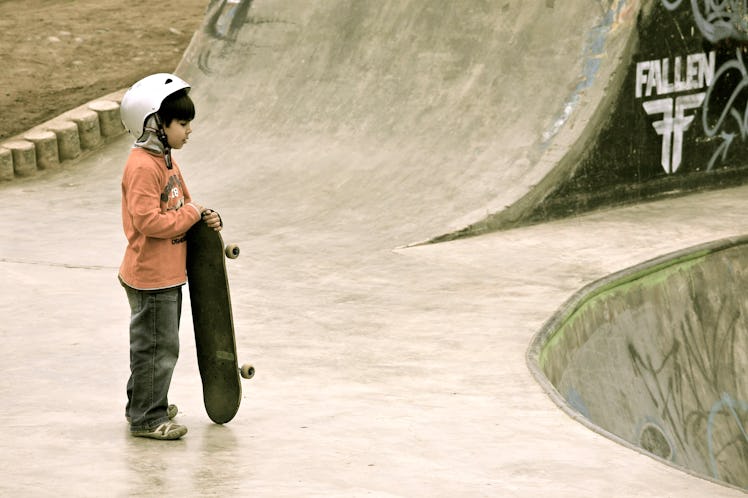Raise Fearless Kids With These Tips From A Blind Man Who Rides A Bike
See what you're doing wrong here?

Some kids seem naturally fearless, while others are terrified of their own shadow (blame repeat viewings of Disney’s Peter Pan). But every type of kid can benefit from having parents that let them take risks and discover that, yes, falling does hurt. So, if you’re the type of neurotic parent who secretly wants to be the confidence boosting parents, consider the parents of Daniel Kish.
When Kish was 13 months old he lost his sight. Now, at 50, people know him as the blind guy who learned to “see” by clicking his tongue and listening for echoes. And, much like Daredevil (another man without fear), he used it to learn how to navigate in the woods, determine if a building facade is flat or featured, and even ride a damn bike.
“The bike thing was my dad’s idea,” says Kish, who is also founder of the World Access For The Blind, a nonprofit that serves to educate and empower people about the capabilities of the sightless. “He was probably drunk when he came up with it,” says Kish. His advice for the parents of blind children he teaches to climb trees and ride mountain bikes is much like the advice for any parent: Take risks, but be smart.
Be A Bit Old School
Kish grew up at a time when the phrase “helicopter parent” probably meant your father was piloting a whirlybird … or a huey … or whatever the hell they used to call them. Parents didn’t hover, liability waivers weren’t ubiquitous, and “safety surface” was an oxymoron. Looking back, he thinks that was a net positive. It allowed kids to learn limits for themselves. “As a society we are so fear-based now,” says Kish. “A lot of fathers these days are from my generation, and if I were a parent, I’d really try to get in touch with my own boyhood and share that with my children.” The lessons from the past: Loosen up, take a chance, and hope for the best. (Also, whirlybird is a better word for helicopter.)
Poles Are For Running Into
Kish has a saying: Running into a pole is a drag, but never being allowed to run into a pole is a disaster. “Whether your child is blind, learning to ride a bicycle, or trying to make new friends, there’s the potential for discomfort,” says Kish. “Pain is the price of learning. It kind of has to happen.” That crash sound is your kid getting an important lesson in physics.
Don’t Let Your Baggage Burden Your Kid
Maybe you’re more of an X Games spectator than participant, but don’t make that your kid’s problem. “We foist our own baggage on our children,” says Kish. “Our insecurities, our struggles, our foibles.” At one point, he was thinking of adopting a child, and during that time he thought hard about his own reclusive, introverted, private nature. He opted not to become a father, but Kish believes other parents should be aware of their own limitations and not hand them down. “I thought, this is a characteristic I wouldn’t want my child to feel. I wanted to be sure it wasn’t a choice I was making for them.”
Flickr /
Slap On a Helmet And ‘Er Rip
Kish once taught a 12-year-old boy with a chest deformity to ride a mountain bike. At first, he was wracked with guilt because the kid’s weakened chest made him really vulnerable. So what did Kish do? He bought a chest protector for the kid, got past his own anxiety, and carried on. Being fearless doesn’t mean being an idiot (although Jackass is an interesting case study). If you take necessary precautions — like putting on a helmet or wrist guards — you’re probably doing your duty as a parent. Do the basic things to set your kid up for a good, safe learning experience. Whatever happens next is between them and the halfpipe.
Use It Or Lose It
It’s never too late to take up cage fighting or BASE jumping — or is it? A child’s brain development can actually be restricted if they can’t try new, difficult — possibly scary — things. “If your brain isn’t being challenged to perform certain functions it loses the capacity to do those things,” he says. He likes this lesson because it lets parents make a choice for their kids based on wisdom, not fear. You’re damned if let your kid get hurt. And you’re damned if you don’t let them. At least if you let them, they might teach you how to surf in your retirement.
This article was originally published on